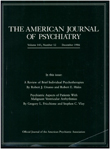Neuroendocrine abnormalities in bulimia
Abstract
The authors examined the relationship of clinical variables, family history, and neuroendocrine function in 18 bulimic patients. Twelve of 18 patients (67%) showed abnormalities of cortisol suppression, and 8 of 10 (80%) showed blunted thyrotropin-releasing hormone (TRH) tests. These findings suggest that neuroendocrine abnormalities identified previously in anorexia nervosa are not solely an artifact of low weight and, further, that eating disorders and affective disorders may share neurochemical similarities.
Access content
To read the fulltext, please use one of the options below to sign in or purchase access.- Personal login
- Institutional Login
- Sign in via OpenAthens
- Register for access
-
Please login/register if you wish to pair your device and check access availability.
Not a subscriber?
PsychiatryOnline subscription options offer access to the DSM-5 library, books, journals, CME, and patient resources. This all-in-one virtual library provides psychiatrists and mental health professionals with key resources for diagnosis, treatment, research, and professional development.
Need more help? PsychiatryOnline Customer Service may be reached by emailing [email protected] or by calling 800-368-5777 (in the U.S.) or 703-907-7322 (outside the U.S.).



